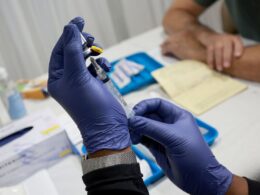Should we wear masks during the holidays to prevent COVID the flu and RSV? Should we resume wearing masks in large gatherings over the holidays, given the prevalence of RSV, flu, and COVID, or are we safe to do without them if we have received vaccinations? To learn more about the viruses this season, The News & Observer spoke with Dr. David Weber, associate chief medical officer at UNC Medical Center and medical director of UNC’s Department of Infection Prevention.
Table of Contents
THIS YEAR, SHOULD WE WEAR MASKS TO HOLIDAY GET-TOGETHERS?
When they’re gathered outside their typical household bubble, particularly vulnerable people, such as those with underlying immune disorders, organ transplant recipients, cancer, and older people, should think about wearing a mask, according to Dr. Weber. COVID, RSV, and the flu spread through droplet contact with the environment.
Read more: Before your flight to South Florida, do you need a COVID or flu test? Information for the holidays
Our current wintertime environment, with its lower temperatures and low humidity, is ideal for them. Most household cleaners and hand sanitizers will eliminate all three viruses. Dr. Weber advised people to practice good hygiene and hand washing this holiday season.
The risk of contracting and spreading these diseases is not primarily due to wearing a mask while traveling. He said it all depends on what you do once you arrive at your destination. “Spending time with large groups, eating and mingling in close quarters. That is what will put you in the most danger.
WHICH IS THE BIGGEST CONCERN THIS YEAR: COVID, RSV, OR THE FLU?
According to Dr. Weber, the biggest worry at the moment is COVID. Respiratory syncytial virus (RSV) activity peaked in September and October but has since subsided. The flu has declined since its peak in late October and early November.
HOW CAN YOU TELL IF YOU HAVE THE FLU, RSV, OR COVID?
You can only definitively determine which of these three illnesses you have by getting tested because the symptoms are so similar.
UNC offers 4-plex tests that screen for all three diseases to help doctors determine the best course of action. A sore throat or runny nose will frequently be the first sign, followed by congestion, coughing, and sneezing. All three are susceptible to developing pneumonia, and other frequent issues, particularly in kids, can include nausea, vomiting, headaches, and diarrhea. It is possible to experience multiple illnesses simultaneously or even all three.
WHAT IS RSV?
RSV, also known as the respiratory syncytial virus, is a widespread virus that typically spikes every winter, though it spiked a few months earlier in our area. RSV is contagious and can make anyone ill, but premature infants and elderly people are more susceptible. Most people who contract it will recover in a week or so.
Vaccination cannot prevent RSV, but it can be treated with antibodies (which is particularly successful in young infants). According to Dr. Weber, RSV is a common illness that needs to be taken seriously because its infection and mortality rates resemble those of the flu.









